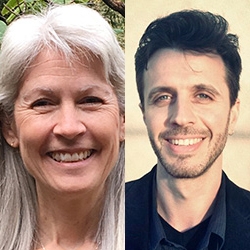
Search Results: habits
-
Rachelle Lamb invites us to consider how our well being is impacted by what we choose to put at the center of our narrative regarding our needs. And how that affects whether or not we get closer to truly serving life and compassion...
-
In this prerecorded telecourse, Raj Gil uses an interactive dialogue and proven exercises to help you develop a profoundly healthy response to anger, right in the moment.
-
What is it that enables us to thrive? How can we influence our capacity to live a meaningful and fulfilling life? Join Jim and Jori Manske in this exciting telecourse recording on the intersection of NVC and cutting-edge Positive Psychology, the science of human thriving.
-
Every one of us is impacted many times each day by micro-freezes that are the resulting fallout from both recent and long ago painful events. During this powerfully healing course, Sarah will walk you through a unforgettable tour of neuroscience, and succinctly demonstrate how NVC and neuroscience together can change your brain and enable your life to become both more fluid and far more resilient.
-
In this book excerpt, Kathleen and Jared offer a path to reach deeper clarity, distinguishing between response and reaction.
-
- Gain a new, surprising, and exciting connection to yourself that will enable you to both deepen the sense of power in your life and actualize everything you've always dreamed of…
- Experience being fully present in the world — despite your habits — so that you'll always be connected to your inner center and thus be able to choose at any given moment where to take your life…
- Understand how to create within yourself (and others!) a sense of flow and love, making your life much more beautiful and exciting…
- Learn how to open up in your relationships in ways you never thought would be possible, creating an entirely different closeness and intimacy in your life…
-
Trainer Tip: Research shows long-term change comes when people have intrinsic desire to change. Extrinsic motivation is temporary and often only lasts while we're observed (eg. driving the speed limit when police are there). Notice where you're mostly intrinsically or extrinsically motivated. How does this feel? For instance, do you call mom because you want to connect with her? Or because you’re worried she’ll be hurt if you don’t?
-
Come fall in love with yourself again…
In this course recording, facilitated by Arnina Kashtan, you will discover your ability to...
- Simply love yourself…
- Live fully and express your greatness in the world… and
- Shorten the way to realizing your true self!
Arnina will share with you the deepest process of self-connection and meaningful discovery. You will learn how to listen to your innermost self, discover how to lead a life that is much more than anything you have ever dreamed of, and fall in love with yourself all over again!
-

In this 6-session course Sarah Peyton will take you through the 5 levels of unconscious contracts that can create patterns of self-sabotage and self-defeat. Each session introduces a different unconscious contract based on various aspects of relational neuroscience and provides support for the release of these contracts.
Sarah Peyton shows you how, with deep empathy, self-accompaniment, and an understanding of neuroscience, you can free yourself from your original constraints.
It can be bewildering to be human.
We can make so many choices that are not good for us. Why do we persist in habits, incapacities or self-judgments that are harmful to our long-term well-being?
The answer to this question is surprising – it is usually either love – or - paradoxically, survival!
Love is at the root of self-sabotage.
Though we often aren't aware of it, our nervous systems are essentially still paired with our earliest caregivers and often related to how we responded as a child. Our first interactions shape us in ways that can limit our life energy.
-
Reactivity is the misperception of threat coupled with lack of access to compassion and wisdom. Sensitivity is an ability to deeply perceive data, plus consciously attend to and attune to data, as it comes through the five senses. It can be a gift. If you lack the skill to care for any of your sensitivity-overwhelm by setting boundaries, you may develop reactive habits, like suddenly withdrawing or lashing out in order to get relief.
-
As you witness injustices in the world, tension, anger, hopelessness, despair and more, may rise up in you. These feelings may lead to reactive thinking that doesn't contribute to healing nor wise action. Mourning is a universal need. If your culture pushed away grief and its emotional expression, you may have habits that block your access to the aliveness of grief. Read on for ways to give grief the space and support it needs.
-
-
Without self-acceptance any attempt at growth and transformation, even while parenting, can easily become a path to self-judgments and another yardstick against which to measure ourselves as falling short. Instead, we can practice 1 minute a day or more, or while doing other tasks, to develop the self-compassion and self-acceptance needed to grow both new habits and our capacity to meet our children with calm and compassion.
-
When someone stimulates your pain, you may want them to express care and empathy for your experience. If they're unwilling, you may resent it. You may forget the power of many strategies to meet a need, and you lose your agency. This can lead to reactive habits in you -- such as pleading, demanding, or attacking. Here are reasons you may not be getting an apology or empathy, and what options you have in moving forward.
-
-
NVC practice is based on several key assumptions and intentions. When we live based on these assumptions and intentions, self-connection and connection with others become increasingly possible and easy, helping us contribute to a world where everyone’s needs are attended to peacefully.
-
Trainer Tip: Mary offers 3 foundational tips for making requests: positivity, specificity and doability.
-
Recently, I have been pondering anger, how I express it and the jackal story I tell myself about it. Marshall Rosenberg taught that anger is a natural emotion that is based on a judgment of someone else or myself. I agree with this, so I have been doing some “enemy images” and self-empathy work (and praying for those who are most likely to be the recipients of my anger). My goal was to clear my judgments and take responsibility for my “stuff.” It has helped a lot, and yet I still feel a general anger in me that is not directly related to anyone or any specific situation.
-
Listen to this introductory 4-session Mediate Your Life telecourse recording to change your response to conflict and change your life.
-
Trainer Tip: It's impossible to value other people’s needs and remain compassionate if we simultaneously harbor judgments. If we're willing to shift this behavior we can translate our judgments into acknowledging how something affects us. Once I got into the habit of this, my judgments began to subside dramatically. It became easy to love people and feel compassion for them, and I experienced a freedom I had never known before.





















